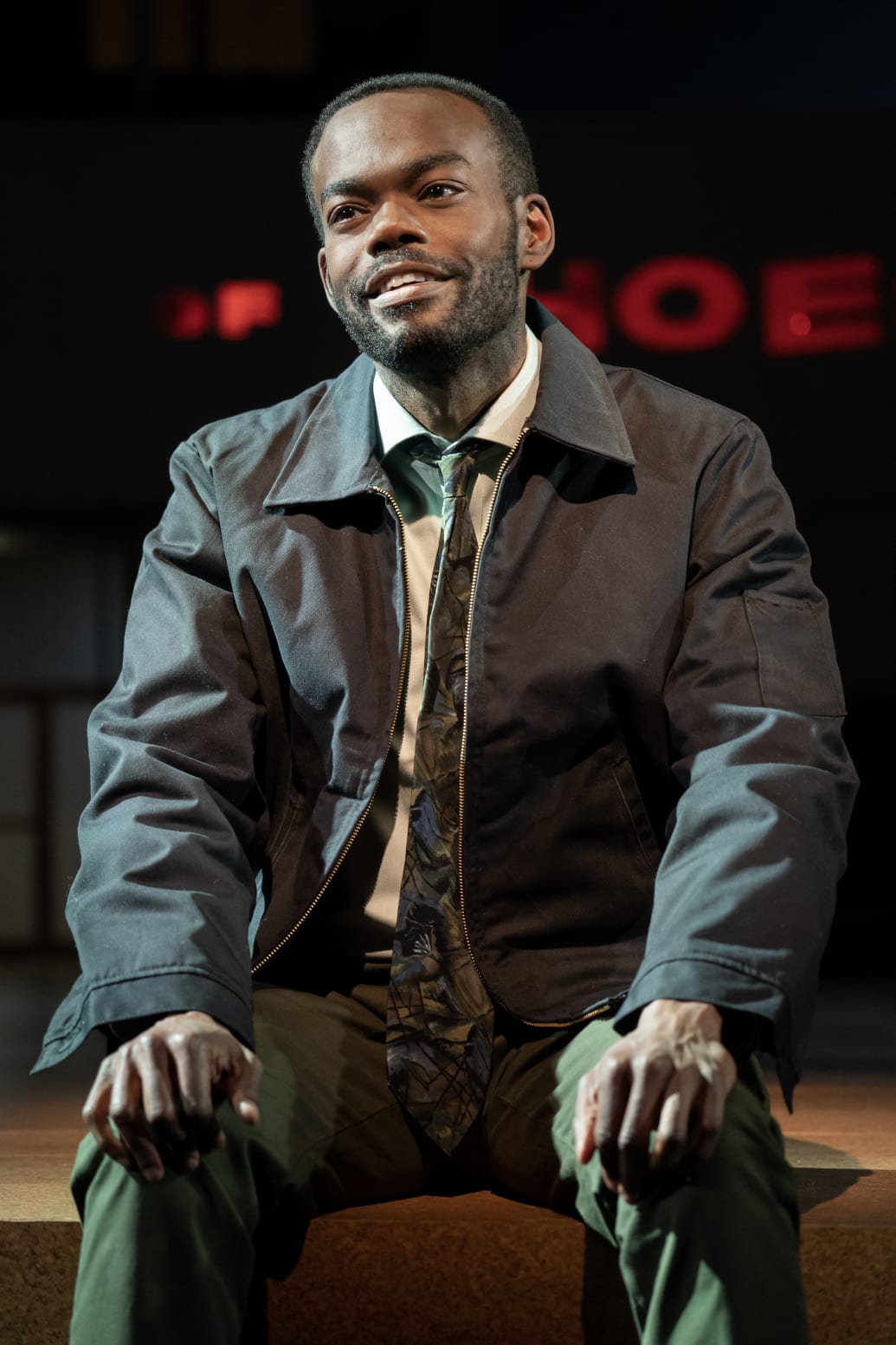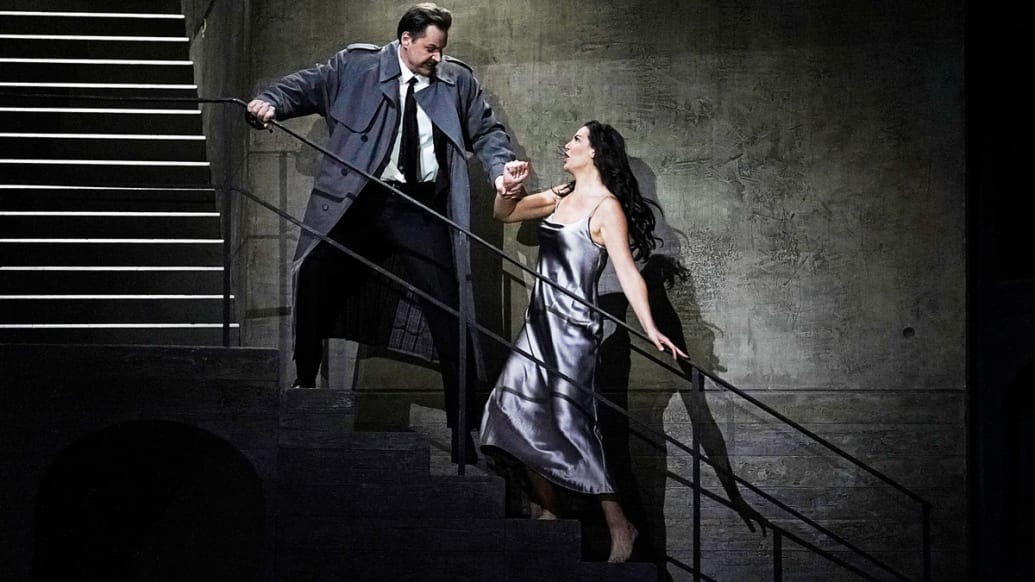All the hype at the moment is about the Tony Awards, and who will win Broadway’s most glittering prizes. But New York City’s best new play—truly, it is five-star exceptional, book a ticket right now—is happening off-Broadway, a bunny-hop from the pulsing neons of Times Square.
Primary Trust (Laura Pels Theatre, to July 2), as beautifully written by Eboni Booth as it is directed by Knud Adams, is a 95-minute, intermissionless, buffed-to-gleaming jewel, following the life of a handsome, charming man named Kenneth (Emmy-nominated The Good Place star William Jackson Harper), who—capsized early in life by a horrifically traumatic event—struggles, mulls, deflects, and cheerfully and not-so-cheerfully interrogates how to progress with his life in the suburb of Cranberry, New York.
Part of the seductive pull of this Roundabout Theatre Company production—developed by Victory Gardens Theater, Chicago—is watching Kenneth periodically leave a play’s traditional confines to address us. This also makes the play hit even harder because we become his cheerleaders-by-association. Kenneth takes us very directly on the journey he himself undertakes confronting past trauma, and embracing then rejecting self-delusion and self-isolation. He/Harper is a beguiling storyteller and protagonist—blunt, honest, sweet, vulnerable, strong, soft, and sharp.
When Kenneth first appears he stands center stage, and cannot find the right words to tell us what we are about to see; it is too much for him, and slowly we begin to see why. Eventually, he settles on: “This is the story of a friendship. Of how I got a new job. A story of love and balance and time. And the smallest of chances. My name is Kenneth. I’m thirty-eight years old and I live in Cranberry, New York, a suburb about forty miles east of Rochester.”
The town catchphrase is “Welcome Friend, You’re Right on Time!”—although Kenneth seems injuriously lost in time. The town is, he tells us, mostly white, “but there are some Black people,” like him. His minority status is another brick in the intriguing wall of distance he has built to partially separate himself from the world around him.
However, Kenneth is part of the world. “I am good with people,” he says at one point, and we see him mostly ace his job dealing with the public. We also see how this 9 to 5 existence is a very carefully tended personal ecology; Kenneth has chosen, up to now, how to make the real world’s proximity and influence on his life bearable and manageable.
Everything in front of us is engagingly and imaginatively rendered: Booth’s words, Adams’ direction, the actors’ delivery, its pace, the set (by Marsha Ginsberg), music (by Luke Wygodny, who plays it himself, unobtrusively at the side of the stage), and lighting (by Isabella Byrd).
Then there is the charm and sharpness of the ensemble. Principally, that charm belongs to Harper, who makes you intensely root for Kenneth once it becomes evident how damaged he is, and once we see the devastation inside him. But the others shine too. April Matthis—who in 2019 in this very theater, triumphed (winning an Obie Award) as Toni Stone, the first woman to play professionally in baseball’s Negro Leagues—plays a number of roles, principally Corrina, a waiter at Wally’s, Kenneth’s favorite restaurant where he sinks Mai Tais (so many Mai Tais… they end up on the table, lined up like skittles).

William Jackson Harper, left, and April Matthis in 'Primary Trust.'
Joan Marcus
Kenneth tells us, “Wally’s is an old tiki restaurant with carpeting, and there’s always a man in a Hawaiian shirt playing the keyboard next to the salad bar. Most nights of the week you can find me at a table sipping on a mai tai. Fifteen years from now, most of that land will be cleared and covered in pavement and new condominiums, but for right now, it feels like some version of home.”
Some of the comedy in the play is down to repetition, and the slight differences in what Wally’s is serving up that day, such as the sing-songy “Welcome to Wally’s, New York’s oldest tiki hut and home to the Ultimate Man Lunch Special, coming with your choice of mac and cheese, coleslaw, or hush puppies. My name is Duncan and I’ll be your waiter this afternoon.” Matthis has a virtuoso’s grip on the multiple wait staff she can hold within.
At that table, listening to Kenneth recite his news and concerns, sits a man named Bert (Eric Berryman, who also appeared in Toni Stone). Kenneth says they are best friends, but the truth about who and what Bert really is is tied up with Kenneth’s heartbreak and trauma, and the trap-door refuge of his own mind that he has long sought sanctuary in.
Jay O. Sanders plays the bookstore owner whose selling-up means Kenneth must find new employment at the Primary Trust bank in which he then plays the avuncular manager. Most winningly, with no words, he is also a sniffily exacting waiter at a fancy restaurant. Around them all, in Ginsberg’s doll’s house-ish design, the various buildings of the town sized to the humans who work among them; the lights of Wally’s ping on when Kenneth and Burt adjourn there.

William Jackson Harper in 'Primary Trust.'
Joan Marcus
Trying to describe the play, or what happens to Kenneth, risks spoiling a piece of theater this critic would dearly love as many people as possible to experience. What one can emphatically say is that Primary Trust, named after the bank Kenneth ends up working in, is utterly absorbing—both very funny and piercingly moving. We see Bert trying to help Kenneth to breathe when things get too much; we see the effects of trauma rise up in Kenneth when confronted by a not-that-demanding bank customer. We see him run out of options, when he must confront what has happened to him. We see unexpected kindness and understanding, where we are usually primed in real and dramatic worlds for the opposite. We see, per the play’s title, tentative trust repaid in spades.
Part of Kenneth’s passage back to reality comes by working at the bank, and seeing the world in sharper close-up. One night, in a beautifully described walk through town, Kenneth tells us: “I watched couples walking through leaves and children opening bottles of Coca-Cola, I should have been happy. Work was good. I had my high solution numbers and no one seemed to have discovered Bert. It was better than I could have imagined. But I felt quiet and lonely. Why did I want to howl like a wild animal?”
Nothing progresses as expected in Primary Trust, and yet it is rooted in a resolute humanity. We celebrate the foundations of a friendship rather than a love affair. We cheer as a man faces up to his past to embrace the reality of the present. Wally’s does feel like home, but when Kenneth ditches the Mai Tais and goes for a fancy martini with Corrina, you almost cheer his amazed gulp of the unfamiliar alcohol within. Mai tai liberation achieved!
Kenneth finally details to us, in another exquisite slice of writing by Booth and the summit of a peerless performance by Harper, his new life in the actual world, and—knowing what made him retreat from it—you may both cheer and tear up at the momentous nature of his opening of those psychological doors. Perfect-anything rarely exists, but Primary Trust is pretty darn near to a perfect play.
Don Giovanni
Another treat is at the Metropolitan Opera, where there are two remaining performances of Ivo van Hove’s Don Giovanni (May 27, June 2), conducted by maestro Nathalie Stutzmann in her Met debut. In the title role of Mozart’s 1787 opera, Peter Mattei plays the seethingly comical and also not-comical heartbreaker, aided by his hapless buddy-meets-henchman Leporello (bass-baritone Adam Plachetka).
Jan Versweyveld’s brutalist set evoking the most forbidding Seville streets you could ever imagine is at first uninviting and too blank a canvas. Later, it becomes ingenious, as its whimsical lighting of corridors and rooms acts as a precursor for a set of stunning climactic visuals. You want to see Don Giovanni go to hell for all his bad behavior towards women? Oh, he really goes to hell here.

Peter Mattei, left, as Don Giovanni and Federica Lombardi as Donna Anna in Mozart's "Don Giovanni."
Karen Almond / Met Opera
If the staging is flat and (eventually, way too late) stunning, the performances are—as one—excellent. The wonderful sopranos Federica Lombardi, Ana María Martínez, and Ying Fang play Giovanni’s sexual conquests—Donna Anna, Donna Elvira, and Zerlina—and are variously furious, lovelorn, gaslit, defiant, over it, and vengeful. His treatment of them, and the arrogant pride he has in it, is like #MeToo never happened, and plain bizarre to watch now. In the other chief male roles, tenor Ben Bliss is Don Ottavio, Alfred Walker, Masetto and Alexander Tsymalyuk, the Commendatore, who—killed after a fatal duel—returns in blood-spattered white shirt to literally drag Giovanni to Versweyveld’s projected masterstroke of a terrifying underworld.
All the singing is superlative, even as the story becomes more repetitive, with van Hove finding lots of inventive ways to keep the dramatic plates—of jealousy, revenge, and romantic gulling—spinning. Still, this is an opera so packed with gorgeous arias and great performers stewarding them, the pleasures in this production—particularly notable, Lombardi’s “Or sai chi l’onore,” Mattei’s “Fin ch’han dal vino,” Martínez’s “Mi tradi,” and Bliss’ shimmering “Il mio tesoro”—are a kind of let-them-wash-over-you, luxurious hit parade. No wonder the night this reporter went the audience stayed as long as possible to stand, cheer, and applaud.

